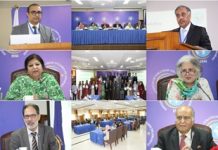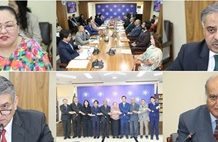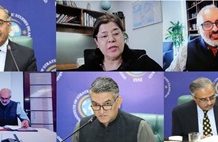The Americans and their local allies in our societies look more at the outcome of democracy than at its process. They are not comfortable with groups, individuals and social movements that may produce uncertainty
There is a common perception in Pakistan and many other Muslims countries that the United States is not interested in promoting genuine democracy through free and fair elections on the basis of popular sovereignty. This perception obviously conflicts with what the American leaders tell their people about foreign policy in our regions; so much so that the ‘average’ American might find it absurd, and even accuse us of being anti-American.
American leaders at home and abroad have consistently used the rhetoric of freedom, justice, human rights, rule of law and democracy to persuade their constituents to support wars in Iraq and Afghanistan. They have justified their interventions on moral, legal and security grounds, and with reference to good causes such as helping people in these countries liberate themselves from tyrannical regimes and eliminating sources of terrorism that might threaten American security.
Ordinary Americans, academics and intelligentsia have lived with an image of the good society cast in their own ideology and historical experience. Naturally, at the popular level, Americans want to see the entire world transformed according to their ideas of an enlightened and progressive society. But is this the American administration’s policy towards Pakistan and other Muslim areas of the world? Not really.
Democracy from the American point of view is a desirable goal, and they do assist Pakistan and other countries indirectly to develop norms and institutions that would help sustain it. But larger national security interests constrain their open and unqualified support to democratic movements in Pakistan and other societies in our part of the world.
This space may not permit me to discuss countries in the Middle East where the United States has consistently supported monarchies on the ground of stability, gradualism, and a preference for evolution over revolutionary upheavals. I want to comment essentially on Pakistan’s current democratic movement and Washington’s policy regarding it, which falls somewhere between guarded silence and ambiguity.
Unlike the Middle East, Pakistan has a long history of democratic struggles and political institutions, which are suffocating due to praetorian interventions, but may regain strength quickly with the political oxygen of constitutionalism.
I think most Americans involved in the policy-making process understand Pakistan’s political heritage and its social capacities to make the transition to democracy, but their heart is not in backing it. They look at the question of democracy in Pakistan through the prism of their immediate interest in defeating the forces of political Islam, Islamic radicalism and the Islam-inspired insurgencies that they face in Afghanistan and Iraq. The Americans would support and welcome democracy only if they were assured that the outcome of the democratic process would be compatible with and supportive of their interests.
The real issue of democratic transition in unstable societies is that free and fair elections, once granted after years of political manipulation and control over the electoral process, produce unexpected results. If the objective is to form a legitimate government through a system of representation, then we should not be concerned about what kind of social classes get defeated and what kind of new social and political forces replace them.
The Americans and their local allies in our societies look more at the outcome of democracy than at its process. They are not comfortable with groups, individuals and social movements that may produce uncertainty in the local political scenarios and have a bearing on the security arrangements of the regions. For this reason, they continue to throw their weight behind autocratic regimes.
Suppressing democratic movements in the Muslim world on fictitious grounds of culture, underdevelopment, poverty and slow growth of civil society has marginalised mainstream political parties, stunting the growth of moderate, tolerant and pluralistic societies. The containment of normal democratic politics in Pakistan has created political opportunities for religious parties and religious and ethnic terrorist groups. Some of them have used their muscle and political power to prop up dictators. These types of groups have benefited from the democratic vacuum in Pakistan. But they are still weaker compared to the major political parties.
Religious political parties have presented themselves as a better alternative to the mainstream political parties, and in some countries they have made substantial electoral gains. The emergence of religious parties is what apparently worries the United States about democracy in Pakistan through free and fair elections.
But American anxiety about the Islamists capturing power in nuclear-armed Pakistan through ballot or bullet is unfounded, because religious parties have a very narrow social support base. They may benefit more from an authoritarian system than in a competitive democracy where they will have to face the mainstream political parties.
The Americans have two additional problems with democracy in Pakistan: Who would really replace Musharraf? And how effective and sincere would an elected government be in fighting the war on terror, or in taking the armed forces along in this war, without Musharraf in the saddle?
Given American stakes in the war on terror, their disquiet about the unknown political future is understandable; what isn’t is their misreading of Pakistan’s political scene, and of Musharraf’s quick and hopeless loss of political ground during the past three months. With every passing day he is losing strength, allies, friends and credibility. If time is of any value and has relevance to the movement for democracy, it does not seem to be on his side.
If we are able to read between the lines, the Americans, in disregard of their public support to freedom of media, independence of judiciary and free and fair elections, want Musharraf and his foreign policy legacy to continue. And they are not willing to take any chances on this because of Pakistan’s key role in the stability and security of Afghanistan. To have a better handle on Pakistan, they want him to stay as the ‘elected’ president, preferably voted in through fresh assemblies.
It is widely speculated, and not without reason, that Washington might have played some behind-the-scene role in bringing Musharraf closer to Mohtarma Benazir Bhutto. Political events as they unfold during the next couple of months would reveal clearly whether the deal is done or the popular sentiment in the Pakistani streets has killed it.
It is true that democracy grows and gets its strength from indigenous conditions. But the question of democratic transition and movement is very different; these can be thwarted or encouraged by great powers with a degree of influence. The United States as a global power claims to be a friend and supporter of democracy and democratic transitions in the Muslim world. The evidence so far does not support this assertion. The ongoing movement in Pakistan presents the US with a fresh opportunity to support democratic transition. It has much leverage and sources of influence that it can use positively to encourage peaceful, genuine democratic change in Pakistan.
The author is a professor of Political Science at the Lahore University of Management Sciences.












